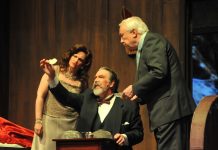First things first:
I LOVE A Little Night Music.
Seriously.
Purists may question that when they see Damascus Theatre Company’s production, opening in February. For this production, I made the decision to update the time period of the show, bringing the turn-of-the-century tale of love and second chances into the present day. Some may ask why I would try to change the show if I love it so much.
So, I’ll tell you.
The primary reason for changing the period is relevance. I’ve talked to many people who love the score (who wouldn’t) but fewer people who have seen the show and found the characters relatable. Sure, not many people know a Countess, or maybe even an angst-ridden, sexually frustrated seminarian. But how can one look at Fredrik Egerman, middle-class, middle-aged lawyer, with a second wife half his age, and not see a familiar face? Perhaps not everyone knows a Fredrik Egerman in real life, but we’ve seen this archetype in modern media everywhere: the man on the other side of 40 who buys a red convertible and dyes his hair. It’s a common trope. By modernizing the show’s setting, then, we take advantage of this familiarity.

But the relevance extends beyond characters to the themes of the show itself. In A Little Night Music, we see former lovers reconnect years after their first relationship ended, both looking for a second chance. This should strike a chord in an era when so many people reconnect with exes and old flames via social media. It’s not uncommon nowadays to hear about marriages ending because someone has found their old flame on Facebook. It’s impossible to ignore just how much social media has changed the dynamic of relationships today. At the start of the rehearsal process for A Little Night Music, the cast for our production had to tell a story about their first boyfriend or girlfriend as an icebreaker. The startling thing about the exercise was not the stories themselves, but how many people kept in touch with decades-old flings, or at least knew what they were up to right now. I can’t imagine this exercise would have played out the same way in the pre-Facebook era.
So, Damascus Theatre Company’s A Little Night Music is updated to highlight relatable themes and (hopefully) connect more strongly with modern audiences.
“But wait,” some might say, “You still didn’t explain why you would change the show if you love it so much.”
Well, that’s easy:
It’s theater.
See, theater is a vibrant, living, breathing art form. What makes it different from movies is that each experience is unique. By contrast, a movie is the same regardless of who is watching it, but a play or musical isn’t — it can change. It’s a dialogue between the actors and the audience. And that’s what’s exciting about it. Live performance has the ultimate “you just had to be there” quality about it. And this means that shows change all the time, from performance to performance, even if it’s in small, nuanced ways. That’s what is supposed to happen: it’s a feature, not a bug.
Theater is about presentation and performance, not preservation. The latter is what museums are for.
The interesting thing about making only one change – time period – is how many other things become affected by it. Suddenly, there is space for new and interesting character choices. The same dialogue and lyrics take on different meanings and offer all sorts of interpretations, allowing the cast space to explore.
Note that I said “the same dialogue and lyrics.” The show contains many dated references, to hip-baths and motorcars and the like, that cast members have asked about updating. And those are all staying in the script, exactly as written. Changing the dialogue to fit a director’s concept is a little too narcissistic – Hugh Wheeler and Stephen Sondheim did just fine when they wrote the show, who am I (or any director) to say that it can be done better? Any change – time period, location, whatever – should be made to heighten existing themes in a particular piece, not just to be showy or artsy-fartsy. And the best way to test that is to say, “Does the piece work as written with this change, or would the text have to be rewritten in order for it to work?” If the piece doesn’t work, then think again about whether you are making the right changes for the right reasons.
Besides, audiences long ago adjusted to the idea of a little anachronism in Shakespeare productions. Nobody blinks an eye when a teenager in a Metallica t-shirt and jeans tells the audience about making his quietus with a bare bodkin. Because Shakespeare’s plays have been presented so many times, they have to be kept vibrant by finding new territory to explore. And modern audiences accept this, even expect it, because Shakespeare’s plays are classics. Well, A Little Night Music is a classic as well. So why not expect the same treatment?
Now, there is the question of the music itself. As I stated earlier, the score is widely recognized as one of Mr. Sondheim’s best. But the songs, mostly variations on a waltz, don’t exactly sound contemporary. So what to do? Update the orchestrations? Fiddle with tempos? Pump in tracked accompaniment played solely on an electric guitar backed by a drum machine? These all sound like horrible ideas, but I won’t pretend that some variations on them weren’t suggested or considered at one time or another. I myself was very jazzed in the early going about having the character of Henrik – who notably accompanies himself in his solo number, playing a cello – instead play a Theremin in our production. But after much debate and thanks to the intervention of our Music Director, Keith Tittermary, Henrik’s cello was reinstated. And we decided to allow the score to be somewhat anachronistic to the contemporary setting, if for no other reason than there was simply no way to change the score that would in any way improve it, and in fact any changes would be ultimately detrimental.
So that’s what we did, and why we did it. I’ve had a blast on this show, and I hope the cast and crew have, too. Come see for yourself; it’ll be like no other production of this show you’ve seen before.

Damascus Theatre Company’s A Little Night Music plays from February 7-23, 2014 at The Arts Barn Theatre – 311 Kent Square Road in Gaithersburg, MD, The show is being presented in partnership with the City of Gaithersburg. For tickets, call the Arts Barn at (301) 258-6394, or purchase them online.
|
Meet the Cast |
|
| Fredrik Egerman Played by: | David Fialkoff |
| Anne Egerman | Alexa Soriano |
| Henrik Egerman | Rob Milanic |
| Petra | Kristina Friedgen |
| Desiree Armfeldt | Liz Weber |
| Fredrika Armfeldt | Miranda Tharp |
| Madame Armfeldt | Rachel Hickson |
| Count Carl- |
Rich Shegogue |
| Countess Charlotte Malcolm | Jenni McGinnis |
| Frid | Matt Kopp |
| The Quintet | Bill BrownCheryl CampoDaniel FlemingDru HarwoodSarah Sylvia Johnson |






Great article. Can’t wait to see the show